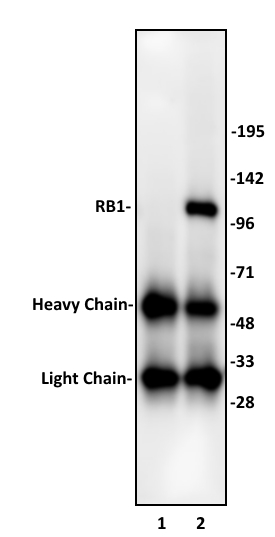RB1 antibody (pAb)
Host / Isotype
Rabbit / IgG
Reactivity
Human
Applications
IP, WB
Cat No : 61585,61586 61585
Synonyms
Validation Data Gallery
Product Information
| Tested Applications |
IP, WB
Applications Validated by Active Motif: IP: 10 ul per IP WB*: 1:500 - 1:2,500 dilution *Note: many chromatin-bound proteins are not soluble in a low salt nuclear extract and fractionate to the pellet. Therefore, we recommend a High Salt / Sonication Protocol when preparing nuclear extracts for Western blot. |
| Tested Reactivity | Human |
| Host / Isotype | Rabbit / IgG |
| Class | Polyclonal |
| Type | Antibody |
| Immunogen | This antibody was raised against a peptide within the C-terminal region of human RB1. |
| Full Name | RB1 antibody (pAb) |
| Synonyms | RB1, Retinoblastoma 1, osteosarcoma, OSRC, RB, Prepro-Retinoblastoma-Associated Protein, Retinoblastoma Suspectibility Protein, p105-Rb, Retinoblastoma-Associated Protein, pRb, Rb, pp110, transcription, repressor, histone h4, h4, h4k20me3, e2f1, suv39h1, suv420h1, suv420h2, smarca4/brg1, hdac, hdac1, polyclonal, pab, antibody, antibodies, immunoprecipitation, ip, western blotting, wb, sample |
| Molecular weight | 120 kDa |
| GenBank accession number | NP_000312 |
| RRID | AB_2793688 |
| Purification Method | Affinity Purified |
| Buffer | Purified IgG in PBS with 30% glycerol and 0.035% sodium azide. Sodium azide is highly toxic. |
| Storage | Some products may be shipped at room temperature. This will not affect their stability or performance. Avoid repeated freeze/thaw cycles by aliquoting items into single-use fractions for storage at -20°C for up to 2 years. Keep all reagents on ice when not in storage. |
Background Information
RB1 (Retinoblastoma 1) is a key regulator of entry into cell division that acts as a tumor suppressor. Promotes G0-G1 transition when phosphorylated by CDK3/cyclin-C. Acts as a transcription repressor of E2F1 target genes. The underphosphorylated, active form of RB1 interacts with E2F1 and represses its transcription activity, leading to cell cycle arrest. Directly involved in heterochromatin formation by maintaining overall chromatin structure and, in particular, that of constitutive heterochromatin by stabilizing histone methylation. Recruits and targets histone methyltransferases SUV39H1, SUV420H1 and SUV420H2, leading to epigenetic transcriptional repression. Controls histone H4 'Lys-20' trimethylation. Inhibits the intrinsic kinase activity of TAF1. Mediates transcriptional repression by SMARCA4/BRG1 by recruiting a histone deacetylase (HDAC) complex to the c-FOS promoter. In resting neurons, transcription of the c-FOS promoter is inhibited by BRG1-dependent recruitment of a phospho-RB1-HDAC1 repressor complex. Upon calcium influx, RB1 is dephosphorylated by calcineurin, which leads to release of the repressor complex (By similarity). In case of viral infections, interactions with SV40 large T antigen, HPV E7 protein or adenovirus E1A protein induce the disassembly of RB1-E2F1 complex thereby disrupting RB1's activity.


